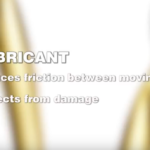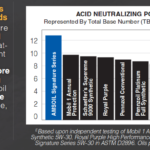Gear oil is often overlooked when it comes to scheduled maintenance on your car or truck.
High-quality gear oil must lubricate, cool, and protect geared systems. It must also carry damaging wear debris away from contact zones and muffle the sound of gear operation. Differential, standard transmission and industrial machinery gears may require extreme-temperature and extreme-pressure protection in order to prevent wear, pitting,
spalling, scoring, scuffing and other damage that may result in equipment failure and downtime. Protection against oxidation, thermal degradation, rust, copper corrosion and foaming is also important when choosing a gear oil for your equipment.
How Gear Oil and Motor Oil Differ
Gear oil are differnet from motor oil. While many motorists may assume SAE 90 gear oil is thicker than SAE 40 or 50 motor oil, they are actually the same viscosity; the difference is in the additives.
Motor oils and gear oils both have anti-wear additives. They both must lubricate, cool and protect components. Gear oils, however, may be placed under extreme amounts of pressure, creating a propensity for boundary lubrication, a condition in which a full-fluid lubricating film is not present between two rubbing surfaces. For example, differentials in cars and trucks have a ring-and-pinion hypoid gear set. A hypoid gear set can experience boundary lubrication, pressures and sliding action that can remove most of the lubricant off the gears. To prevent this environment, extreme-pressure additives are incorporated into the AMSOIL gear oils. AMSOIL synthetic gear oils are formulated with an extra treatment of extreme pressure additives in order to reduce wear and extend gear and bearing life.
Additional Differences
Because many of the components found in the drivetrain consist of ferrous material, the lubricant must prevent rust and possible corrosion to other materials. Rust and corrosion problems are not nearly as prevalent in engines.
The many small and intricate components that make up gear sets can be quite noisy and may be subjected to shock-loading. The viscosity and extreme-pressure formulation of gear oil quiets gears and dissipates shock-loading. The rotating motion of the gear sets also tends to churn the lubricant, leading to foaming. If a gear lube foams, its load carrying capacity is significantly reduced because the air suspended within the oil is compressible. For example, when the gear teeth come into contact with each other, any trapped air bubbles compress, reducing the thickness of the separating oil film. In turn, this reduction could lead to direct metal to metal contact between gear teeth and
result in accelerated wear of the gears. The gear oil must have the ability to dissipate this entrapped air, ensuring a sufficient lubricating film that protects the gears against contact wear.
AMSOIL Provides Gear Oil Options for your vehicles and equipment
AMSOIL offers premium synthetic drivetrain lubricants to meet the needs of nearly every application. The synthetic base stocks and top-quality additive packages found in AMSOIL gear lubes and transmission fluids provide the ultimate in wear protection for cars, trucks, outboards, heavy-duty and racing applications. AMSOIL sells gear oil for severe service cars and trucks, gear oil for racing applications, long life gear oils for over the road trucks, and marine gear oils.

Learn what gear oil are needed for your car, truck, or equipment in the AMSOIL look up guide. Or if you know the oils you need ORDER online now.
If you are a commercial business and are looking for bulk quantities contact Bruce at 717-645-4358 for application and pricing details.

